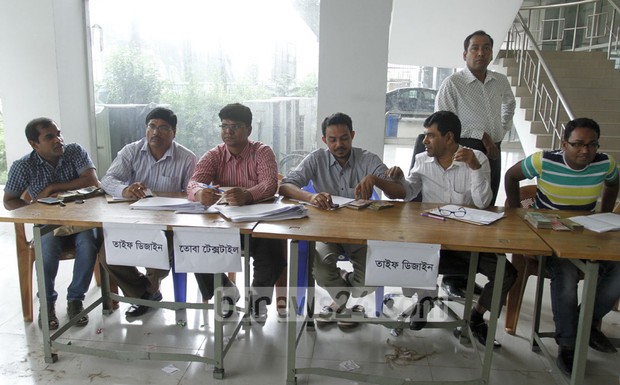The problem is with the “Or Else” part. The political talking heads are throwing deadlines like “pay by Thursday’’, the BGMEA is saying it will pay by Wednesday and various and sundry ministers are frothing at the mouth at the name of Tuba. As all this back and forth is going on, the situation at the Tuba Group’s premise has deteriorated perceptively. While there has been police throwing tear gas and charging baton wounding a number of people, a call for sector wide strike by the labour leaders has also taken place. This is a nightmare that keeps visiting the single most important export sector for Bangladesh. The country earns something like $26 billion a year from garments export but can’t seem to stop chasing the tail of disasters like a cat on hot tin roof!
This is a bad situation made worse by lack of transactional rules for management and lack of enforceability. OK, big words here, what I really mean is that a bad situation is being made worse by all sides. Let us examine how the actors are making the situation progressively intolerable.
The factory owners: Tuba Group is part of the same ownership that owned Tazreen Garments which was gutted by a fire and killed scores of factory workers. So, obviously the management of the Group is full of incompetent and somewhat short sighted folks. Running any business is tricky and requires management agility, financial acumen and little bit of luck. Obviously, Lady Luck has turned away from these hapless guys. They also seem to be sorely lacking in financial acumen. I can testify that meeting payroll every two weeks for my little operation is not easy from time to time. This must be hugely difficult for a company which has 1,000 plus employees and cash strapped for any number of reasons including the volatility of the garment sector. But, it is the fiduciary responsibility of the management and the owners to ensure that there is enough money to meet payroll on a timely basis. If that is not feasible then the business is in effect bankrupt and should officially go bankrupt. It seems that Tuba Group is a group of zombie companies living on hopes and prayers and great deal of deception. The question is why these companies are allowed to continue to defraud their workers for months on end and eventually create the situation that is playing out now. Answer to that lies with the government and rule of law.
The unions and labour leaders: So, the labour leaders are saying things like, “we want everyone paid, and the factories to stay open so that the workers can maintain their livelihood”. There has never been a more foolish and blind statement like this maybe since we threw out the communist system into the dustbin of history. A factory is not a welfare organisation; it is first and foremost a profit generation entity for the entrepreneurs. The jobs, livelihood, good working conditions are there because the company is viable and making profit. Take away the economic incentives and then you have nothing; no jobs, no livelihood, no labour and no unions, nada, nada! When I was young I used to go to study groups at night and read about things like “Surplus Value of Labour” and other Marxian fantasies with the self-proclaimed Lefties. Over time, I have come to understand that it is never the “surplus” value of labour that actually creates wealth but it is the organisational and profit driven mind of the entrepreneur that creates the value. Now, the organisation and the entrepreneur alone do not get you to a healthy place unless we have people who are willing to work and generate the value for the company and income for themselves. It is a cooperative effort and needs all parties to share the fruits of labour. The problem at Tuba is that the dishonest owners have cheated the workers of their rightful wages. While they should have been shutting down the business, they kept on going knowing full well they cannot make payroll and now the workers are on a campaign that will put yet another black eye on the garments sector and may or may not get them paid.
The government and rule of law: Finally, the main culprit in my view is lack of well-designed laws and rules for conducting business and treating the employees. All businesses are fraught with risks but that does not mean we simply go back to the dark corner and go home to mama. Over the many hundred years, there have been programmes, laws and rules of game that allow companies to take risk but within a manageable framework. What I mean is this, if there were laws about declaring a company insolvent when it is unable to pay for the salaries we could have avoided the heartache that is Tuba Garments. In all of the developed world (including China) the employer must pay an unemployment tax for every dollar of real wages. This creates a fund for the workers just in case a company goes belly up and the workers are unemployed for a length of time. As in humans, death is part of life, the risk of becoming insolvent is part of doing business. In Bangladesh the Talking Society, namely, the BGMEA, could actually collect a similar unemployment tax (contribution, chanda call it whatever you want) for the very purpose of mitigating fiascos like the one taking place in Tuba Garments. So, let us say, every factory is required to keep three month’s salary of the total salary base in a trust fund maybe with the BGMEA. The fund will invest in unrelated low risk projects to keep up an income stream. Every year the income portion can be distributed back to the factory owners while retaining the core trust fund amount.
But, they would rather talk and talk. Of course, at the mention of a trust fund the owners will scream and holler but the reality is that over time it will be just the cost of doing business. Another alternative is for the unions to establish similar trust funds. These steps will require third party trustees with fiduciary responsibility and great deal of transparency.
Some of the solutions outlined maybe alien to the Bangladeshi landscape but the reality is that Bangladesh is knocking at the door of becoming a middle income country. The Bankruptcy Act of 1997 that was implemented on November 3, 1997 is woefully short on corporate bankruptcies and the ways to deal with insolvent and zombie companies. I could not find any law or Act that can give the companies and workers a roadmap of living in a world where the companies can grow and prosper, along with the workers but reduce the impact of insolvencies, bad and fraudulent management or just acts of nature like flood or fire.
I know that some of you would prefer a fire and brimstone rant from me on this. But, I think this tragedy is a product of being at the beginning of the learning curve about managing large workforce in a volatile marketplace. Let us put together a trust fund that soften the impacts of such disasters as opposed to killing the golden goose, a.k.a. the garments industry of Bangladesh.
———————————-
Kayes Ahmed runs a small yet global apparel and design business based in Boulder, USA.
Source: bdnews24










